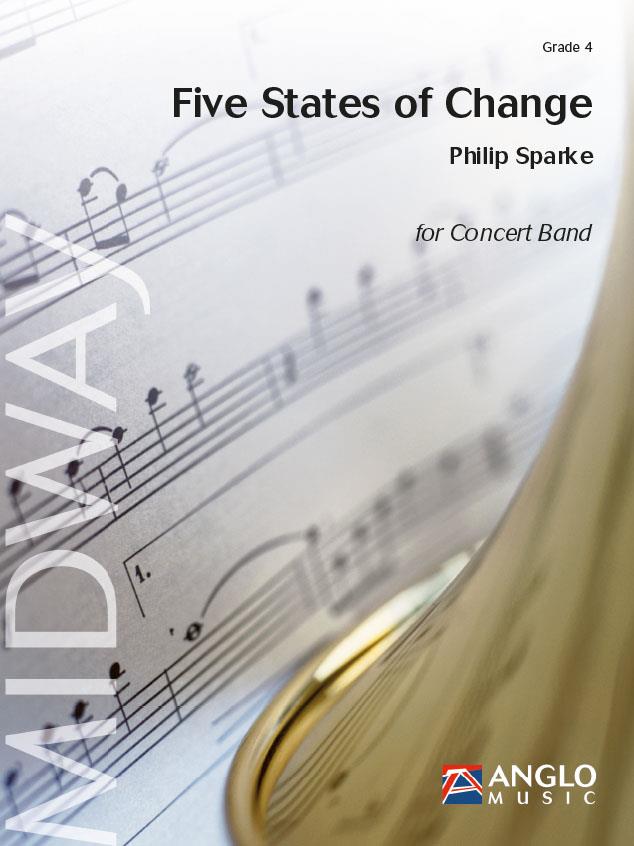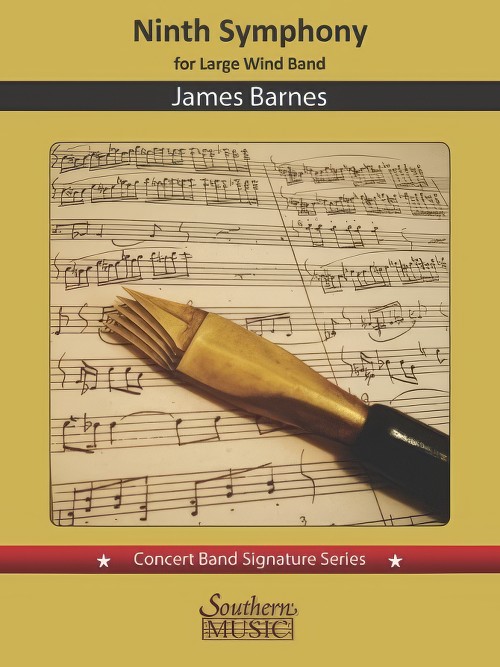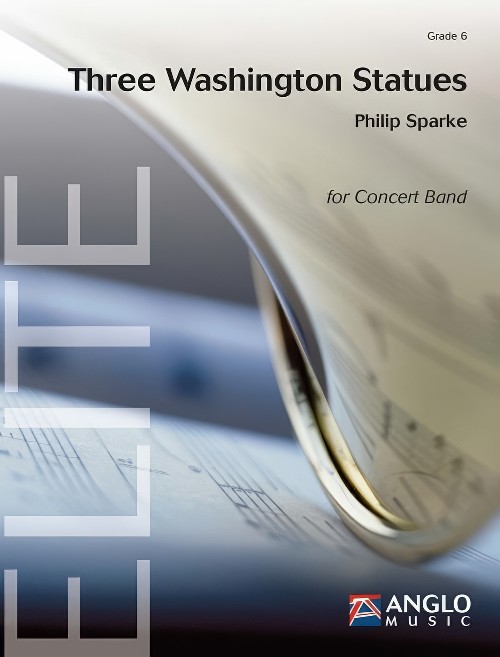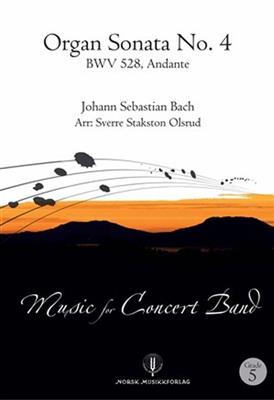Results
-
 £183.99
£183.99Five States of Change (Concert Band - Score and Parts) - Sparke, Philip
Five States of Change was commissioned by Kunstfactor for the 4th section of the Dutch National Brass Band Championships (NBK) 2011. It is dedicated to Jappie Dijkstra and the Music Information Centre (MUI), Arnhem, Holland, in acknowledgement of their outstanding work in developing band repertoire.The composer writes:The idea for the piece came when I was reading an article about a branch of Chinese philosophy which is abbreviated as Wu Xing*, which has no exact translation but can mean, for example, five elements, five phases or five states of change. It is central to all elements of Chinese thought, including science, philosophy, medicine and astrology, and in simple terms tries to create various cyclic relationships between five elements in all walks of life. An example is: Earth - Metal - Water - Wood - Fire - (Earth) etc. where (in one cycle) earth bears metal, metal changes to liquid (water) when heated, water helps trees grow, wood burns to create fire, fire produces ash (earth) and the cycle continues. I was particularly interested in the cycle of emotions:- Meditation - Sorrow - Fear - Anger - Joy - (Meditation) etc. and thought this cyclic principle would provide an effective emotional journey for a piece of music. So Five States of Change has five equal sections which loosely characterise this emotional cycle. I have tried to make the music grow organically, with minimal repetition, and each movement evolves from the musical elements at the end of the previous one, with the opening material appearing, transformed, at the end of the piece to complete the cycle.*in full Wu zhong liu xing zhi chi or the five types of chi dominating at different times.- Philip SparkeDuration: 12:15
Estimated dispatch 7-14 working days
-
 £137.99
£137.99Odyssee Wind Band Set (Score & Parts)
The Odyssee tells the story of Odysseus, the undaunted hero. In times long ago the blind poet Homer wrote this famous epic. The "Odyssey" follows the "Iliad", the story of the bloody war between the Greek and the Trojans. This battle ends after ten years thanks to the Odysseys famous trick. the Trojan Horse. The Odyssey is not a war epic, but a story about perseverance, loyalty, adventure, and the survival instinct of its ingenious hero. In The Odyssey, Homer describes how Odysseus, the king of Ithaca, had to endure another ten years of affliction after the ten years of war in Troy before he could finally return to his home land. During those years, his wife, Penelope, had to try and keep her many admirers away. These men not only wanted het hand but also the kingship. To prove her husbands worth, she played a trick: "As soon as I have finished weaving this shroud for my father-in-law, Laertes, I will choose one of you to become my husband", she promised them. But during the night, she secretly loosened what she had woven during the day, prolonging the time until Odysseus would finally return. After twenty long years, when he finally stood at the door, she wondered: Is this really my husband? Is he an imposter? Cunningly, she asked him to move the bed, because only she and her husband know that the bed was immovable and was build around an old three trunk! Odysseus was deeply moved: this really was his wife, his Penelope! Nearly three thousands years later, the loyalty and strength of this character, and all the dangerous adventures that Odysseus survived thanks to courage and intelligence, still moves us today. Odyssee by Jan Bosveld is not just an adventure story, but rather a characteristic piece in which memories of Homers story can be heard. The composition opens with a firm, stirring theme describing our hero, Odysseus, in detail: This man is not to be taken lightly. The further development of this short introduction completes this character sketch: trustworthy, perseverant, and a genius. After that we can picture Odysseus on the lonely beach of Ogygia. Do the trumpets depict his memories of the war of Troy? Does he think of his wife, as we recognise the weaving loom of Penelope in the murmuring eighth? In the solemn, plaintive part that follows, we can imagine Penelope feeling lonely, sitting in the womens room with her servants.One of the girls plays the harp, but that does not clear the sombre atmosphere. Then we can imagine seeing the sorceress Circe, who changed Odysseus men into swine. After she gives a simple magic sign something follows that reminds us of the sound of pigs grunting. Then the Odysseus theme resounds: the hero comes to savi his comrades. Assisted by Hermes, he forces Circe to lift the spell. The piece ends the same way as it began, with an animated theme: Odysseus is still the same, undefeated and not to be taken lighty! 07:45
Estimated dispatch 7-14 working days
-
 £137.99
£137.99Odyssee - Jan Bosveld
The Odyssee tells the story of Odysseus, the undaunted hero. In times long ago the blind poet Homer wrote this famous epic. The "Odyssey" follows the "Iliad", the story of the bloody war between the Greek and the Trojans. This battle endsafter ten years thanks to the Odysseys famous trick. the Trojan Horse. The Odyssey is not a war epic, but a story about perseverance, loyalty, adventure, and the survival instinct of its ingenious hero. In The Odyssey, Homer describes howOdysseus, the king of Ithaca, had to endure another ten years of affliction after the ten years of war in Troy before he could finally return to his home land. During those years, his wife, Penelope, had to try and keep her many admirers away.These men not only wanted het hand but also the kingship. To prove her husbands worth, she played a trick: "As soon as I have finished weaving this shroud for my father-in-law, Laertes, I will choose one of you to become my husband", she promisedthem. But during the night, she secretly loosened what she had woven during the day, prolonging the time until Odysseus would finally return. After twenty long years, when he finally stood at the door, she wondered: Is this really my husband? Ishe an imposter? Cunningly, she asked him to move the bed, because only she and her husband know that the bed was immovable and was build around an old three trunk! Odysseus was deeply moved: this really was his wife, his Penelope! Nearly threethousands years later, the loyalty and strength of this character, and all the dangerous adventures that Odysseus survived thanks to courage and intelligence, still moves us today. Odyssee by Jan Bosveld is not just an adventure story, butrather a characteristic piece in which memories of Homers story can be heard. The composition opens with a firm, stirring theme describing our hero, Odysseus, in detail: This man is not to be taken lightly. The further development of thisshort introduction completes this character sketch: trustworthy, perseverant, and a genius. After that we can picture Odysseus on the lonely beach of Ogygia. Do the trumpets depict his memories of the war of Troy? Does he think of his wife, as werecognise the weaving loom of Penelope in the murmuring eighth? In the solemn, plaintive part that follows, we can imagine Penelope feeling lonely, sitting in the womens room with her servants.One of the girls plays the harp, but that does notclear the sombre atmosphere. Then we can imagine seeing the sorceress Circe, who changed Odysseus men into swine. After she gives a simple magic sign something follows that reminds us of the sound of pigs grunting. Then the Odysseus theme resounds:the hero comes to savi his comrades. Assisted by Hermes, he forces Circe to lift the spell. The piece ends the same way as it began, with an animated theme: Odysseus is still the same, undefeated and not to be taken lighty!
Estimated dispatch 7-14 working days
-
 £309.99
£309.99Symphony No. 9, Op. 160 - James Barnes
Premiered on September 21, 2018 in Lawrence, Kansas by the University of Kansas Wind Ensemble (Dr. Paul Popiel, conducting), James Barnes' Ninth Symphony was composed between January and late June of that same year. This large work was commissioned by a consortium of twenty-one college bands, community bands, professional bands and individuals to help mark the 70th birthday of the composer (b. 1949). It is an expansive forty-minute work in four movements, of which the composer writes, This is my last symphony... this work represents a compendium of all that I have learned during the fifty years of composing and scoring for this wonderful new medium: the modern wind band. The first movement, subtitled Elegy, is based around G minor. It is the longest movement of the symphony. Tragic and despondent in character, it is cast in sonata-allegro form. The second movement is entitled Scherzo. Barnes claims that I have always wanted to write a waltz, and that is how this movement is cast, in a modified rondo form in D minor. In contrast to the mood of the first movement, the scherzo is a delightful posy of expansive melody, splashy color, humor and rhythm. The third movement, which is in a modified tertiary form, is entitled Night Music. In contrast to the scherzo, this movement begins with a mysterious incantation, first displayed by solo Alto flute. The music becomes even darker and more mysterious, while overall the movement effectively expresses an otherworldly mood, ending with a solo soprano offstage which suddenly emerges, eerily singing a modified version of the opening incantation. Cast in sonata-allegro form, the fourth movement is most definitely a rousing Finale, beginning with a brilliant fanfare and undergoing several mood transformations before emerging into the final coda, ending the symphony with an energetic splash of color.
Estimated dispatch 7-14 working days
-
 £309.99
£309.99Ninth Symphony (Concert Band - Score and Parts) - Barnes, James
Premiered on 21 September, 2018 in Lawrence, Kansas by The University of Kansas Wind Ensemble (Dr. Paul Popiel, conducting), James Barnes' Ninth Symphony was composed between January and late June of that same year. This large work was commissioned by a consortium of twenty-one college bands, community bands, professional bands and individuals to help mark the 70th birthday of the composer (b. 1949). It is an expansive forty-minute work in four movements, of which the composer writes, "This is my last symphony...this work represents a compendium of all that I have learned during the fifty years of composing and scoring for this wonderful new medium: the modern wind band." The first movement, subtitled Elegy, is based around G minor. It is the longest movement of the symphony. Tragic and despondent in character, it is cast in sonata-allegro form. The second movement is entitled Scherzo. Barnes claims that "I have always wanted to write a waltz," and that is how this movement is cast, in a modified rondo form in D minor. In contrast to the mood of the first movement, the scherzo is a delightful posy of expansive melody, splashy color, humor and rhythm. The third movement, which is in a modified tertiary form, is entitled Night Music. In contrast to the scherzo, this movement begins with a mysterious incantation, first displayed by solo Alto Flute. The music becomes even darker and more mysterious, while overall the movement effectively expresses an "otherworldly" mood, ending with a solo soprano offstage which suddenly emerges, eerily singing a modified version of the opening incantation. Cast in sonata-allegro form, the fourth movement is most definitely a rousing Finale, beginning with a brilliant fanfare and undergoing several mood transformations before emerging into the final coda, ending the symphony with an energetic splash of color. Duration: 40.00
Estimated dispatch 7-14 working days
-
 £164.99
£164.99Three Washington Statues (Concert Band - Score and Parts) - Sparke, Philip
Three Washington Statues was commissioned by the United States Army Band "Pershing's Own", led by Colonel Thomas H. Palmatier. Washington D.C. contains some of the world's most iconic monuments, memorials and statues. Philip Sparke has chosen three of these as the inspiration for this piece: 'The Lincoln Memorial' in the form of a Greek Doric temple in which the composer depicts the grandeur of this monument; 'The Martin Luther King, Jr. Memorial' on which steps the iconic speech 'I have a dream' was given - the music is both reverential as well as powerful referring to Martin Luther Kings' speech; and the 'Encore' statue in memory of the world famous African-American composer, pianist and bandleader Duke Ellington. In this final movement, Philip Sparke catches the virtuosic, energetic and unique dynamism of Ellington's' music. Three Washington Statues was commissioned by the United States Army Band "Pershing's Own", led by Colonel Thomas H. Palmatier. Washington D.C. contains some of the world's most iconic monuments, memorials and statues. Philip Sparke has chosen three of these as the inspiration for this piece: 'The Lincoln Memorial' in the form of a Greek Doric temple in which the composer depicts the grandeur of this monument; 'The Martin Luther King, Jr. Memorial' on which steps the iconic speech 'I have a dream' was given - the music is both reverential as well as powerful referring to Martin Luther Kings' speech; and the 'Encore' statue in memory of the world famous African-American composer, pianist and bandleader Duke Ellington. In this final movement, Philip Sparke catches the virtuosic, energetic and unique dynamism of Ellington's' music.Duration: 8:45
Estimated dispatch 7-14 working days
-
£13.95
Joy to the World
1Joy to the WorldHandel arr. StirlingThe Central Band of the Royal Air Force2.162A Carol Symphony - I. PreludeHely-Hutchinson/WilliamsThe Central Band of the Royal Air Force4.003Shepherd's HeyPercy GraingerThe Central Band of the Royal Air Force2.104A Fireside Christmasarr. Sammy NesticoThe Central Band of the Royal Air Force8.075Dance of the TumblersRimsky-Korsakov/O'DonnellThe Central Band of the Royal Air Force3.486-9A Joyful ChristmasNeil RichardsonThe Central Band of the Royal Air Force I. Ding Dong Merrily on High 1.57 II. Unto Us a Child is Born 3.09 III. O Little Town of Bethlehem 3.24 IV. Masters in This Hall 1.5010Hallelujah ChorusHandel trs. RichardsThe Central Band of the Royal Air Force3.5811Carols from Olde Englandarr. Duncan StubbsThe Central Band of the Royal Air Force9.1112Jesu, Joy of Man's DesiringBach trs. MorrellThe Central Band of the Royal Air Force3.2913Dance of the Sugar Plum FairyTchaikovsky trs. RichardsThe Central Band of the Royal Air Force1.5014-16A Christmas SuiteDavid BarkerThe Central Band of the Royal Air Force I. Chaconne 1.52 II. Scherzo Variations on We Three Kings of Orient Are 2.53 III. Fanfare and Fugue 4.1017Chrismas-TimeStuart L. StirlingThe Central Band of the Royal Air Force5.23
Estimated dispatch 7-14 working days
-
 £172.80
£172.80Organ Sonata No. 4 - Johann Sebastian Bach
This arrangement of Johann Sebastian Bach Andante from Organ Sonata No. 4 was created under the Covid times. Under the long days of isolation, I found the recording of the Islandic virtuoso Vikingur Olafsson.A fantastic recording, and An arrangement for windensemble grew in me. I have tried to find the most beautiful sounds of the windband, and challenge the whole band.I recommend listening to the recording to understand my goal with the arrangement. The movement was a part of the windband Opus 82 performance in Norwegian National Championship in 2022
Estimated dispatch 7-14 working days
-
 £76.99
£76.99Lost Lake at Seymour Valley - Danny Choi
Based on the exhilarating bike ride on the Seymour Valley Demonstration Forest trail and a detour into the remote, beautiful Lost Lake, I associate this piece with some great memories. Glistening in a quiet peace, Lost Lake_x001A_also known as Rolf Lake_x001A_is calm and warm in the summer. Not many people know about it, so it is easy to find yourself alone, surrounded by beautiful nature, isolated from humanity. Back in high school, I would bike up to Lost Lake with one of my best friends Masanori Miyanabe, we'd have music playing off a bluetooth speaker as we biked against the cool air under the hot sun. Powering through uphill stretches with the reward of gliding downhill, when we would finally make it to the lake, we would put our bikes down by the bushes_x001A_no locks, no security_x001A_and we would make our way down the rough logs towards the tiny strip of land suitable for basking in the sun, snacking, and maybe even swimming. In order to beat the sunset, reluctantly, we would mount our bicycles once again and find our way back to the Seymour Valley trail, where we would enjoy the evening ride home. -D.I.D. Choi
Estimated dispatch 7-14 working days
-
 £127.30
£127.30Funky Hedde - Torstein Aagaard-Nilsen
A good friend of mine, trombonist and professor Jesper Juul Windahl commissioned me a trombone quartet. I then wrote Four Nordic Folk Pops. The last of the four is a Norwegian tune called Havard Hedde in a funky version. Then I made a brass quintet version for Lofoten Brass Quintet for a their Australia tour. The trombonist in the quintet asked me for a brass band version to be used in an entertainment contest (SIDDIS Brass). Havard Hedde did not succeed in getting married, but I think this version wil make him dance again. Torstein Aagaard-Nilsen
Estimated dispatch 7-14 working days
